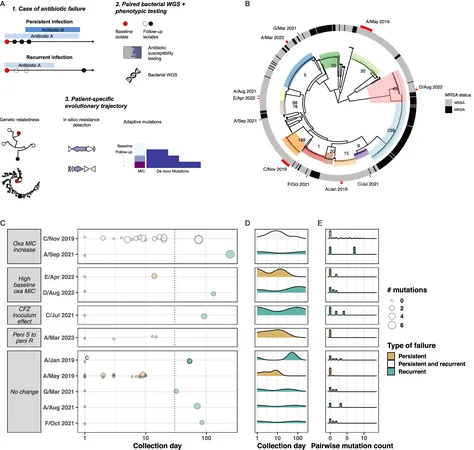
Revolutionizing Healthcare: Real-Time Genomics Unlocks Secrets to Combat Golden Staph Infections
2025-06-04
Author: Wei
In a groundbreaking development, Australian researchers are pioneering the use of real-time genome sequencing to combat severe Staphylococcus aureus infections, commonly known as "golden staph." This superbug is responsible for over a million deaths globally each year, and the stakes have never been higher.
Collaborating with seven prominent hospitals across Victoria, the team from the Peter Doherty Institute for Infection and Immunity has made a stunning discovery: real-time tracking of bacterial changes through genome sequencing during acute infections can provide doctors with critical insights to customize treatment plans, ultimately enhancing patient recovery.
Golden staph is notorious for causing severe health threats, including sepsis, pneumonia, and endocarditis, with a remarkable ability to develop resistance against even the strongest antibiotics. Traditional lab tests merely identify the bacterial strain, but genome sequencing provides a complete genetic map, revealing characteristics crucial for effective treatment.
Under the leadership of Dr. Stefano Giulieri from The University of Melbourne, the team analyzed samples collected from patients suffering from severe, recurring infections when treatment failed. By comparing these samples to those taken at the onset of the infection, they were able to give immediate feedback to the treating physicians.
Historically, studies of bacterial evolution were retrospective, typically conducted long after treatment. The new real-time approach allows clinicians to react swiftly to emerging resistance patterns. In fact, Dr. Giulieri reported that in 33% of cases, the bacteria displayed mutations that greatly reduced the chances of treatment success.
"In one alarming case, after initially stabilizing a patient's golden staph infection, he returned to the hospital two months post-treatment," Dr. Giulieri revealed. "We sequenced his samples and found the bacteria had become 80 times more resistant to the antibiotic used. Every time the infection recurred, it acquired new, perilous mutations. Armed with this data, the clinical team was able to implement a different treatment that ultimately eradicated the infection."
This revolutionary study is the first to demonstrate that real-time bacterial evolution tracking can empower clinicians to outsmart bacteria, enabling them to tailor therapies specific to the bacterial strain. Not only does this improve patient outcomes, but it also minimizes unnecessary treatments and reduces the risk of further antibiotic resistance.
To gauge the impact of this innovative approach, the researchers conducted a survey among 25 infectious disease specialists globally. A staggering 80% found the genomic reports to be highly beneficial, with more than a third stating that the findings influenced their choice of antibiotics.
Professor Eugene Athan, a consultant at University Hospital Geelong, hailed this method as a potential turning point for infectious diseases, paralleling advances seen in cancer genomics. "Real-time tracking of bacterial evolution during severe infections presents a transformative opportunity for clinicians," he stated.
Professor Benjamin Howden, a senior author on the study, emphasized the pivotal implications of these findings. "This research marks a significant stride towards precision medicine for bacterial infections and could pave the way for clinical trials that make this cutting-edge approach a standard practice in hospitals around the world."
As the battle against superbugs heats up, real-time genomics may just be the secret weapon clinicians need to turn the tide and save countless lives.




 Brasil (PT)
Brasil (PT)
 Canada (EN)
Canada (EN)
 Chile (ES)
Chile (ES)
 Česko (CS)
Česko (CS)
 대한민국 (KO)
대한민국 (KO)
 España (ES)
España (ES)
 France (FR)
France (FR)
 Hong Kong (EN)
Hong Kong (EN)
 Italia (IT)
Italia (IT)
 日本 (JA)
日本 (JA)
 Magyarország (HU)
Magyarország (HU)
 Norge (NO)
Norge (NO)
 Polska (PL)
Polska (PL)
 Schweiz (DE)
Schweiz (DE)
 Singapore (EN)
Singapore (EN)
 Sverige (SV)
Sverige (SV)
 Suomi (FI)
Suomi (FI)
 Türkiye (TR)
Türkiye (TR)
 الإمارات العربية المتحدة (AR)
الإمارات العربية المتحدة (AR)